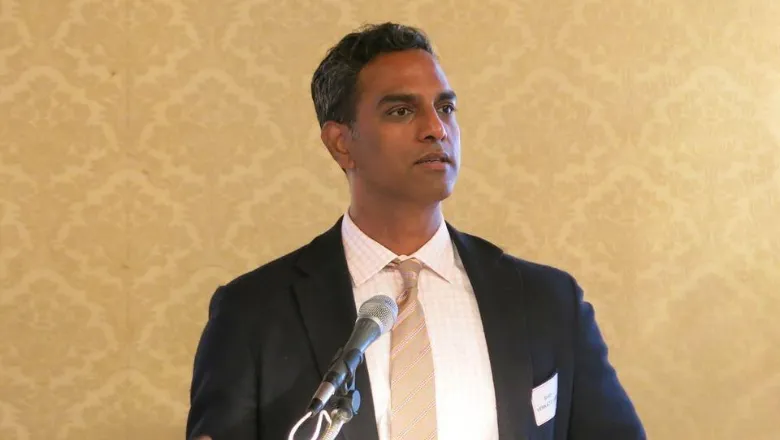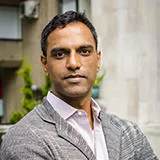I have been thinking about how we can make sure that the conversation and dialogue [around COVID-19] is managed in a way that we have fairness and equity at the centre.
Dr Sridhar Venkatapuram, Acting Deputy Director of King’s Global Health Institute
06 August 2020
King's academic works to ensure an ethical response to COVID-19
Dr Sridhar Venkatapuram has been making sure that ethics and human rights inform responses to COVID-19 worldwide

King’s has been at the forefront of the efforts to tackle COVID-19 in the UK and beyond, from ground-breaking research into the disease and its symptoms, to opening a testing centre to relieve the burden on the NHS. Dr Sridhar Venkatapuram, Acting Deputy Director of King’s Global Health Institute, has been making sure that ethics and human rights norms are informing the local and global responses to COVID-19.
Dr Venkatapuram is a Senior Lecturer in Global Health and Philosophy and Acting Deputy Director of King’s Global Health Institute. He has been an academic-practitioner at the forefront of health ethics and global health for over 25 years.
He was just settling back into King’s after a secondment at the World Health Organisation (WHO) last year when he heard about the outbreak in Wuhan, China. While at the WHO, he had conversations with the outbreaks team about their experiences with Ebola, and had identified gaps where ethicists could advise, and the critical ethical decisions that would have to be made as the world began to take action against a resurgence of Ebola or a pandemic from a novel virus.
The challenges of a pandemic — such as allocating resources in a stretched system, closing borders, mobilising various kinds of professionals and key workers, and restricting public freedoms — are not just issues for scientists and clinicians, but also for philosophers and ethicists like himself.
Since mid-February, Dr Venkatapuram has spoken widely on numerous online webinars about the ethics of various public health policies and options, including the issues of social inequalities in vulnerabilities and deaths, particularly preventable deaths of older people. He sees this as being crucial for the social impact of his research. He was also interviewed by the media in the UK, US and India.
Advising the Greater London Authority
Dr Venkatapuram has been serving on the Greater London Authority’s Science and Technical Advice Cell (STAC) which has been meeting twice weekly since March. STAC monitors the local situation and responds to requests for guidance from the multi-agency London Strategic Co-Coordination Group constituted during emergencies, and from other London institutions.
Ethical questions have been constant during STAC meetings. For example, in response to the planned Black Lives Matter protests in London during the pandemic, STAC considered the risks as well as the rights issues and produced guidance for individuals and communities on the precautions to take if participating in the protests.
Supporting the international response
In late April, Dr Venkatapuram also led a team that was invited to draw up a set of ethical principles for the EU hosted Coronavirus Global Response Pledging Conference, coordinating inputs of ethicists and philosophers from all over the world.
He is now working to ensure these and other global ethics experts are represented, alongside scientist colleagues, on ACT-Accelerator Tools working groups created to develop, manufacture and globally distribute diagnostics, therapies and vaccines.
‘It is not all about how we discover a new drug or a new machine, but part of the work is about protecting people’s interests and rights’, he explains.
Bridging the gap between research and policy
Alongside this practical work in applied health ethics, he has also helped produce an open access volume, Vulnerable: The Law, Policy and Ethics of COVID-19. Co-edited by Dr Venkatapuram, this volume contains contributions from 69 experts, addressing the vulnerabilities and interconnectedness that the pandemic and the global responses have exposed.
It is hoped that this open access volume will transfer some of the global learning from the pandemic into the hands of policymakers and politicians, in order to ensure equity is a central aspect of policies for the second waves and recovery plans.
For Dr Venkatapuram, the idea of service to society forms a crucial part of his attitude to his research and academic career, and this has been particularly true during COVID-19.
I want to use my education and expertise to directly shape the response to the pandemic, in making sure ethics and equity are more prominent and more present.
Dr Sridhar Venkatapuram, Acting Deputy Director of King’s Global Health Institute
You can hear Dr Venkatapuram discuss the vulnerabilities and interconnectedness made visible by the pandemic, and the ethical necessity to center human welfare and wellbeing in policymaking practice, in his Spotlight on COVID interview.
During this period of uncertainty and change, King’s has stepped up efforts to deliver on its promise to make the world a better place by continuing to serve our local, national and international communities.
Find out more about #ContinuingToServe, our university-wide approach to bringing together, strengthening and celebrating the many ways in which King’s people are making a difference.
Delivering the UN Sustainable Development Goals
King's College London has a long and proud history of serving the needs and aspirations of society. We are committed to the UN Sustainable Development Goals (SDGs) as a university, and we use them as a framework for reporting on our social impact. The SDGs are a set of 17 goals approved by the 193 member states of the United Nations (UN) which aim to transform the world by 2030. This work supports SDGs 3, 16 and 17.

